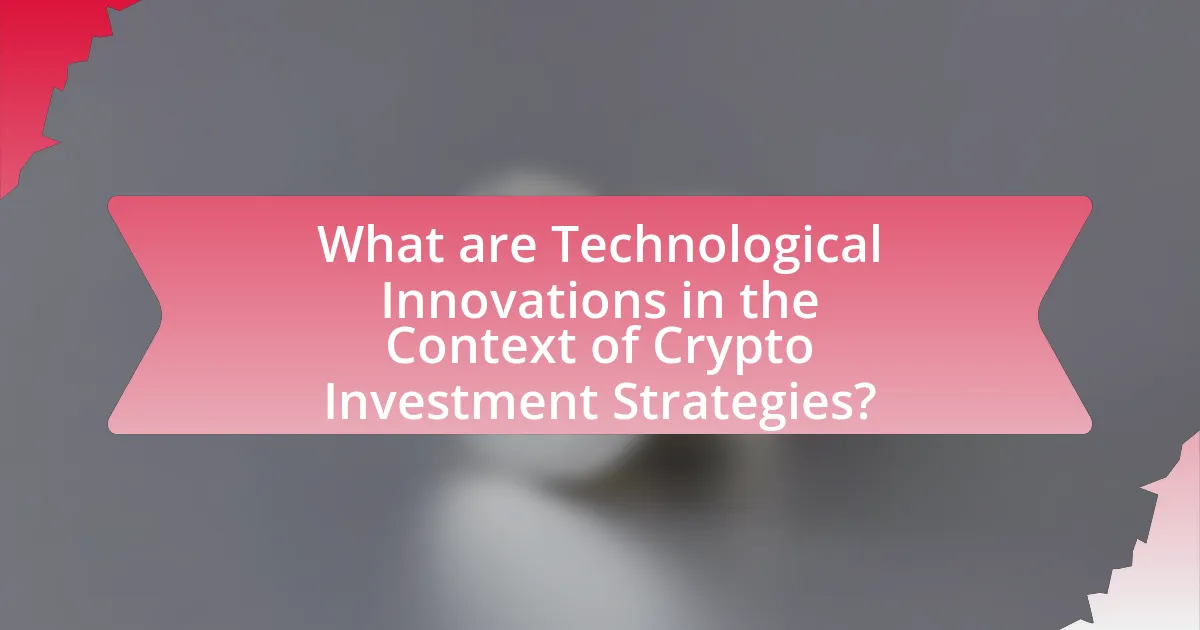The article examines the impact of technological innovations on crypto investment strategies, highlighting key advancements such as blockchain technology, algorithmic trading, decentralized finance (DeFi), and artificial intelligence (AI). It discusses how these technologies enhance transaction efficiency, security, and accessibility, while also reshaping investor behavior and decision-making processes. The article further explores emerging investment strategies driven by these innovations, the associated risks, and the importance of continuous education for investors to adapt to the evolving landscape of cryptocurrency. Additionally, it addresses future trends and best practices for leveraging technology in crypto investments.

What are Technological Innovations in the Context of Crypto Investment Strategies?
Technological innovations in the context of crypto investment strategies include advancements such as blockchain technology, algorithmic trading, decentralized finance (DeFi), and artificial intelligence (AI) for market analysis. Blockchain technology enhances transparency and security in transactions, which builds investor confidence; for instance, Bitcoin’s underlying blockchain has proven to be secure since its inception in 2009. Algorithmic trading utilizes complex algorithms to execute trades at optimal times, significantly increasing efficiency and reducing human error; a report by the Financial Times noted that algorithmic trading accounts for over 60% of all trades in the U.S. equity markets. DeFi platforms enable users to lend, borrow, and earn interest on their crypto assets without intermediaries, which has grown the total value locked in DeFi to over $80 billion as of 2023. AI applications in crypto investment strategies analyze vast amounts of data to predict market trends, with firms like Numerai using machine learning models to crowdsource predictions from data scientists. These innovations collectively reshape how investors approach the crypto market, enhancing decision-making and optimizing returns.
How do technological innovations influence the crypto market?
Technological innovations significantly influence the crypto market by enhancing transaction efficiency, security, and accessibility. For instance, the introduction of blockchain technology has enabled decentralized transactions, reducing the need for intermediaries and lowering transaction costs. Additionally, advancements in smart contracts automate processes, increasing trust and reducing fraud. According to a report by the World Economic Forum, by 2025, 10% of global GDP could be stored on blockchain technology, highlighting its transformative potential. Furthermore, innovations like decentralized finance (DeFi) platforms have democratized access to financial services, attracting a broader range of investors and increasing market liquidity.
What specific technologies are driving changes in crypto investment strategies?
Blockchain technology is the primary driver of changes in crypto investment strategies. It enables decentralized finance (DeFi) platforms, which allow users to lend, borrow, and trade without intermediaries, thus increasing accessibility and liquidity. Additionally, advancements in artificial intelligence (AI) and machine learning are enhancing predictive analytics, allowing investors to make data-driven decisions based on market trends and sentiment analysis. Furthermore, the rise of smart contracts automates transactions and reduces the need for trust in counterparties, streamlining investment processes. These technologies collectively reshape how investors approach crypto assets, emphasizing efficiency, transparency, and innovation in investment strategies.
How do these technologies enhance security and transparency in crypto investments?
Technologies such as blockchain and smart contracts enhance security and transparency in crypto investments by providing immutable records and automated execution of agreements. Blockchain technology ensures that all transactions are recorded in a decentralized ledger, making it nearly impossible to alter past records without consensus from the network, thereby preventing fraud. For instance, Bitcoin’s blockchain has maintained integrity since its inception in 2009, with over 600,000 blocks secured. Smart contracts further enhance security by automatically executing transactions when predefined conditions are met, reducing the risk of human error or manipulation. According to a report by the World Economic Forum, blockchain could reduce compliance costs by up to 30% in financial services, highlighting its potential to improve transparency and trust in crypto investments.
Why is it important to understand the impact of technology on crypto investments?
Understanding the impact of technology on crypto investments is crucial because technological advancements directly influence market dynamics, security, and investment strategies. For instance, innovations such as blockchain technology enhance transaction security and transparency, which can lead to increased investor confidence and market participation. Additionally, the rise of algorithmic trading and artificial intelligence in crypto markets has transformed investment strategies, allowing for more efficient trading and risk management. According to a report by the Cambridge Centre for Alternative Finance, the integration of technology in crypto trading has led to a significant increase in trading volumes and market liquidity, underscoring the importance of staying informed about technological trends to make informed investment decisions.
What risks are associated with technological advancements in crypto?
Technological advancements in crypto introduce several risks, including security vulnerabilities, regulatory uncertainty, and market volatility. Security vulnerabilities arise from the complexity of new technologies, which can lead to exploits and hacks; for instance, the DAO hack in 2016 resulted in a loss of $60 million worth of Ether due to a flaw in smart contract code. Regulatory uncertainty stems from the evolving legal landscape, where changes in government policies can impact the viability of crypto projects, as seen with China’s crackdown on cryptocurrency trading in 2021. Market volatility is exacerbated by technological innovations that can lead to rapid price fluctuations, evidenced by the extreme price swings of Bitcoin and other cryptocurrencies following announcements of technological upgrades or forks.
How can investors leverage technology to improve their investment outcomes?
Investors can leverage technology to improve their investment outcomes by utilizing advanced analytics, algorithmic trading, and blockchain technology. Advanced analytics allows investors to analyze vast amounts of data quickly, identifying trends and making informed decisions based on real-time market conditions. Algorithmic trading automates trading strategies, enabling faster execution and reducing human error, which can enhance profitability. Blockchain technology provides transparency and security in transactions, reducing fraud risk and increasing trust in the investment process. According to a report by Deloitte, 39% of financial services firms are already using blockchain technology to enhance operational efficiency and improve customer trust, demonstrating its effectiveness in improving investment outcomes.

How are Investment Strategies Evolving Due to Technological Innovations?
Investment strategies are evolving due to technological innovations by incorporating advanced algorithms, artificial intelligence, and blockchain technology. These innovations enable more efficient data analysis, allowing investors to make informed decisions based on real-time market trends and predictive analytics. For instance, AI-driven trading platforms can analyze vast amounts of data at speeds unattainable by human traders, leading to optimized trading strategies and reduced risks. Additionally, blockchain technology enhances transparency and security in transactions, fostering trust among investors. According to a report by Deloitte, 39% of financial services firms are already using AI in their investment strategies, highlighting the significant shift towards technology-driven approaches in the investment landscape.
What new investment strategies have emerged from technological advancements?
New investment strategies that have emerged from technological advancements include algorithmic trading, decentralized finance (DeFi) protocols, and the use of artificial intelligence for predictive analytics. Algorithmic trading leverages complex algorithms to execute trades at optimal times, significantly increasing efficiency and reducing human error. DeFi protocols enable peer-to-peer financial transactions without intermediaries, allowing for innovative lending, borrowing, and yield farming opportunities. Additionally, artificial intelligence analyzes vast datasets to identify market trends and make informed investment decisions, enhancing the potential for higher returns. These strategies reflect the integration of technology in finance, transforming traditional investment approaches.
How do algorithmic trading and AI influence crypto investment decisions?
Algorithmic trading and AI significantly influence crypto investment decisions by enabling data-driven strategies that optimize trading efficiency and accuracy. These technologies analyze vast amounts of market data in real-time, allowing traders to identify patterns and execute trades at high speeds, which is crucial in the volatile crypto market. For instance, a study by the CFA Institute found that algorithmic trading can reduce transaction costs by up to 30% and improve execution quality, thus enhancing overall investment performance. Additionally, AI algorithms can adapt to changing market conditions, providing investors with insights that traditional methods may overlook, further solidifying their impact on investment strategies in the cryptocurrency space.
What role does blockchain technology play in shaping investment strategies?
Blockchain technology fundamentally transforms investment strategies by enhancing transparency, security, and efficiency in transactions. Its decentralized nature allows for real-time tracking of assets, reducing the risk of fraud and increasing trust among investors. For instance, a report by Deloitte highlights that blockchain can streamline the settlement process, cutting down transaction times from days to minutes, which significantly improves liquidity. Additionally, the use of smart contracts automates and enforces agreements, minimizing the need for intermediaries and lowering costs. This shift towards automation and transparency is reshaping how investors approach asset management and portfolio diversification, making blockchain a pivotal element in modern investment strategies.
How do technological innovations affect investor behavior in the crypto market?
Technological innovations significantly influence investor behavior in the crypto market by enhancing accessibility, improving security, and facilitating real-time data analysis. For instance, the introduction of user-friendly trading platforms and mobile applications has lowered entry barriers, allowing a broader range of investors to participate. Additionally, advancements in blockchain technology, such as smart contracts, have increased trust and transparency, leading to higher investor confidence. A study by the Cambridge Centre for Alternative Finance indicates that the number of global crypto users reached over 300 million in 2021, reflecting the impact of these innovations on market participation. Furthermore, tools like algorithmic trading and AI-driven analytics enable investors to make data-informed decisions quickly, thus altering traditional investment strategies.
What psychological factors are influenced by technology in crypto trading?
Technology in crypto trading significantly influences psychological factors such as fear of missing out (FOMO), overconfidence, and decision-making biases. The rapid pace of market changes and the availability of real-time data can exacerbate FOMO, leading traders to make impulsive decisions to capitalize on perceived opportunities. Additionally, technology can foster overconfidence, as traders may rely heavily on algorithms and automated trading systems, believing they can predict market movements accurately. Research indicates that cognitive biases, such as confirmation bias, are heightened in tech-driven environments, where traders may seek information that supports their existing beliefs while ignoring contradictory data. These psychological influences can lead to increased volatility and irrational trading behaviors in the crypto market.
How do social media and online platforms impact investment strategies?
Social media and online platforms significantly influence investment strategies by facilitating real-time information sharing and community engagement. These platforms enable investors to access market sentiment, trends, and insights quickly, which can lead to rapid decision-making. For instance, a study by the University of California, Berkeley, found that tweets about stocks can predict price movements, demonstrating how social media can shape investor behavior. Additionally, platforms like Reddit and Twitter have become hubs for discussions that can drive volatility in asset prices, particularly in the cryptocurrency market, where community-driven movements can lead to substantial gains or losses. This dynamic illustrates the critical role that social media and online platforms play in shaping modern investment strategies.

What are the Future Trends of Technological Innovations in Crypto Investment Strategies?
Future trends in technological innovations in crypto investment strategies include the increased use of artificial intelligence (AI) for predictive analytics, the integration of blockchain technology with decentralized finance (DeFi), and the rise of automated trading systems. AI is expected to enhance decision-making by analyzing vast datasets to identify market trends and investment opportunities, as evidenced by a report from Deloitte indicating that AI can improve trading efficiency by up to 30%. The integration of blockchain with DeFi platforms is set to revolutionize traditional finance by enabling peer-to-peer transactions without intermediaries, which has already seen significant growth, with DeFi protocols reaching over $80 billion in total value locked as of 2023. Additionally, automated trading systems, powered by algorithms and machine learning, are becoming more prevalent, allowing investors to execute trades at optimal times based on real-time market data, thus increasing potential returns. These trends indicate a shift towards more sophisticated, data-driven investment strategies in the crypto space.
What upcoming technologies are likely to impact crypto investments?
Upcoming technologies likely to impact crypto investments include blockchain interoperability solutions, decentralized finance (DeFi) advancements, and artificial intelligence (AI) integration. Blockchain interoperability solutions, such as Polkadot and Cosmos, enable different blockchain networks to communicate, enhancing liquidity and investment opportunities. DeFi advancements, including automated market makers and yield farming, are transforming traditional finance by offering decentralized alternatives, which can attract more investors. AI integration in trading algorithms and market analysis tools is improving decision-making processes, allowing investors to analyze vast amounts of data quickly and accurately. These technologies are reshaping the landscape of crypto investments by increasing efficiency, accessibility, and potential returns.
How might advancements in quantum computing affect crypto security?
Advancements in quantum computing could significantly undermine crypto security by enabling the decryption of cryptographic algorithms currently deemed secure. Quantum computers utilize principles of quantum mechanics to perform calculations at speeds unattainable by classical computers, which allows them to potentially break widely used encryption methods, such as RSA and ECC, that protect cryptocurrencies. For instance, Shor’s algorithm, designed for quantum computers, can factor large integers exponentially faster than the best-known classical algorithms, posing a direct threat to the security of public key cryptography. As a result, the rise of quantum computing necessitates the development of quantum-resistant cryptographic protocols to safeguard digital assets against these emerging threats.
What potential does decentralized finance (DeFi) hold for future investment strategies?
Decentralized finance (DeFi) holds significant potential for future investment strategies by enabling greater accessibility, liquidity, and innovation in financial services. DeFi platforms allow users to lend, borrow, and trade assets without intermediaries, which can reduce costs and increase efficiency. For instance, as of 2023, the total value locked in DeFi protocols exceeded $50 billion, demonstrating substantial market interest and participation. This growth indicates that investors can leverage DeFi for diversified portfolios, yield farming, and automated trading strategies, ultimately reshaping traditional investment approaches.
How can investors prepare for the future of crypto investment strategies?
Investors can prepare for the future of crypto investment strategies by diversifying their portfolios and staying informed about technological advancements in the blockchain space. Diversification reduces risk by spreading investments across various cryptocurrencies and related assets, which can mitigate the impact of market volatility. Staying informed about innovations, such as decentralized finance (DeFi) and non-fungible tokens (NFTs), allows investors to identify emerging trends and opportunities. For instance, the total value locked in DeFi protocols reached over $80 billion in 2021, highlighting the rapid growth and potential of this sector. By actively engaging with educational resources and participating in community discussions, investors can enhance their understanding and adapt their strategies to leverage new technologies effectively.
What best practices should investors adopt to stay ahead of technological changes?
Investors should adopt continuous education and proactive engagement with emerging technologies to stay ahead of technological changes. By regularly attending industry conferences, participating in webinars, and following reputable tech news sources, investors can gain insights into trends and innovations that may impact their investment strategies. For instance, the rapid development of blockchain technology and decentralized finance (DeFi) has reshaped the crypto landscape, making it essential for investors to understand these advancements. Additionally, leveraging analytical tools and platforms that provide real-time data on market trends can enhance decision-making. According to a report by Deloitte, 80% of financial services firms are investing in blockchain technology, highlighting the importance of staying informed about technological shifts that could influence investment opportunities.
How can continuous education in technology enhance investment success?
Continuous education in technology enhances investment success by equipping investors with up-to-date knowledge and skills necessary to navigate rapidly evolving markets. Investors who engage in ongoing learning can better understand emerging technologies, such as blockchain and artificial intelligence, which are pivotal in shaping investment strategies in the cryptocurrency space. For instance, a study by the CFA Institute found that 70% of investment professionals believe that continuous education significantly improves decision-making capabilities. This knowledge allows investors to identify trends, assess risks, and leverage new tools effectively, ultimately leading to more informed and successful investment choices.
What practical tips can investors implement to adapt to technological innovations in crypto?
Investors can adapt to technological innovations in crypto by continuously educating themselves about emerging technologies such as blockchain advancements, decentralized finance (DeFi), and non-fungible tokens (NFTs). Staying informed allows investors to identify new opportunities and risks associated with these innovations. For instance, according to a report by Deloitte, 76% of executives believe that blockchain will be a critical part of their business strategy within the next two years, highlighting the importance of understanding this technology. Additionally, investors should utilize analytical tools and platforms that provide real-time data and insights on market trends, enabling them to make informed decisions quickly. Engaging with online communities and forums can also provide valuable insights and peer support, further enhancing their adaptability in a rapidly evolving landscape.















